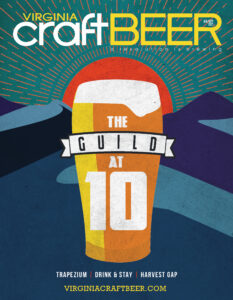By Jeff Maisey
“Good beer starts with good ingredients,” said Jeff Bloem, founder and maltster at Charlottesville-based Murphy & Rude Malting Co.
Bloem’s point certainly rang true last summer when his next door business neighbors at Decipher Brewing took home Best-of-Show honors with its Barley Late Kolsch as the crown jewel of the Virginia Craft Brewers Guild’s 2022 Virginia Craft Beer Cup competition. A key ingredient in the top dog beer was Murphy & Rude’s Virginia Pils Malt.
“It was a major pride moment,” Bloem said of Decipher’s success. “It obviously speaks to their brewing ability, and I think its also a great example of how good our malts are.”
In essence, for those non-brewers reading, malt is a grain — wheat, rye, oat, corn etc — that has been prepared specifically for brewing. The malting process involves several steps: germination, kilning, stewing, crystallization, and drum roasting applications. Water is used to extract natural sugars from the grain to ultimately feed the yeast for fermenting.
When the craft beer boom exploded across Virginia following the passing of SB604 in 2012, granting breweries the ability to see directly to consumers via a tasting room, Jeff Bloem marveled at the number of beer makers springing into operation across the Commonwealth.
Then the wheels started turning in his head — where were these upstart breweries getting their essential ingredients?
“Back in 2013, I was talking with a friend who was thinking of opening a distillery and our conversation turned towards the supply side of what was then a pretty booming craft beverage scene, whether it was breweries or distilleries,” Bloem recalled. “I perked a curiosity in me of wondering with all of these breweries coming online, seemingly overnight, who were these wise maltsters out there taking advantage of this opportunity, and I realized there was nobody.”
Bloem proceeded to research the process of malting and the variety of grains used to create a product brewers desired.
“I really got enamored with what it takes to actually grow the grain that is required to make good malt that breweries will demand,” he said.
Bloem, who was working as a government contractor bid proposal manager, feel in love with the agricultural side of the supply side of the regional brewing and distilling industry. His interest evolved from being a curiosity, to a hobby (he built a nano-malting system in his basement to share with his homebrew friends), and then as a business.
“I ended up liking it more than I intended to,” he said.
After gaining proper education on malting and connecting with regional farmers, Jeff Bloem began operating Murphy & Rude Malting Co. in 2017 with a mission of creating “radical malts for differentiating products. Just to hear Bloem speak on the topic of grains and malts is a fascinating educational experiences, and apparently infectious.
This year, Murphy & Rude will triple its malt production.
Among the malts produced by Murphy & Rude are the Virginia Pils, Vienna, Munich 9 & 15, Crystal 40 through 120, Roasted Barley, Chocolate Wheat, Cimmerian Wheat, Belgian Amber, Bloody Butcher Corn, 6-Row Pale, Soft Red Wheat, and the ultra rare Soft White Wheat, a lesser utilized ingredient developed at Virginia Tech and now exclusively “permitted” to Murphy & Rude.”
According to Bloem, Murphy & Rude’s expansion is the result of demand from Virginia breweries wanting locally harvested ingredients with a certain boldness and quality to give their beers that something extra that can set them apart from the others who use the standard products imported from Germany or trucked across the nation.
With a somewhat saturated retail environment for craft beer and with a number of breweries shutting down, an important ingredient for success is proving to be fresh, flavorful, unique malts.
One brewery that contracts with Bloem’s business as its primary specialty malt producer is Three Notch’d Brewing Company, the largest independent production brewery in Virginia. Others almost exclusively using M&R malts: Black Narrows (Chincoteague Island), Bluejacket (DC), Crooked Run (Sterling/Leesburg), Dynasty (Ashburn), Hardywood (Richmond), Heliotrope (Lexington), Random Row (Charlottesville), and Wheatland Spring (Waterford).
Jeff Bloem’s story is inspirational in that he’s a self-taught maltster who learned through trial-and-error, sought out Virginia farmers to determine what grains would grow well in our climate, and listened to brewers and distillers to determine how he could improve their products.
“It took me a long time to build-up a farmer network that would support a commercial scale business,” Bloem said.
Today, Bloem works directly with harvesters at Brann Farms (Christiansburg), Wheatland Springs Farm (Waterford), Hill View Farms (Danville), Three Monkeys Farm (Reston), Piedmont Grain & Cattle (Rochelle), and Bay’s Best Feed (Heathsville).
For breweries these days, a good first impression is essential and putting their best possible pint of liquid in the hand of that discerning customer is important.
Bloem’s first year ambition was similar.
“In my first year my number one priority was reputation management. So, if I had to dump a batch, I’d dump a batch. There’s nothing, by any means, that was going out of this place that was not something I would put up against any other malt house in the country.”
Apparently, for Murphy & Rude Malting Co., good malt and impressions leads to good beer. And that’s a good thing for all.



